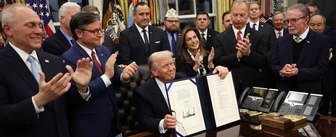Despite several U.S. athletes (including at least one medal favorite, U.S. tennis star Coco Gauff) testing positive for the coronavirus, Americans in the latest Economist/YouGov poll continue to express hope for a successful Tokyo Olympics. Overall, Americans tend to approve (46%) of the U.S. competing this year. About three in 10 (28%) disapprove.
Americans of all political beliefs tend to approve of Americans participating in the Olympic Games. Half of Republicans (52%) and Independents (49%) support the country sending its athletes, compared to 44% of Democrats. Those who intend to watch lots of Olympic events (66%) are especially likely to want U.S. athletes to be there.
While Americans want their athletes to compete, by two to one they also want them vaccinated (56% say they should be required to get vaccinated, 26% disagree). Those who plan to watch events daily are even more likely (72%) to want them vaccinated. But this is another case where politics and perception of the severity of the threat matters. Republicans narrowly reject a vaccine mandate for U.S. athletes (41% support it, 45% oppose it). Majorities of Democrats (77% vs 11%) and Independents (52% vs 30%) support it.
Three-quarters of fully vaccinated Americans (76%) also want the athletes to be vaccinated, compared to 14% who say this should not be a requirement. Those who reject the vaccine for themselves also reject requiring it for U.S. Olympians (11% would support a vaccine mandate, 70% would not).
By 40% to 29%, the public expects the Games, which begin this week, to be a success. Two-thirds of those who plan to watch a lot of the events (68%) believe the Olympics will be a success.
But that doesn’t mean that the public thinks it was a good decision to hold the (postponed) Olympics in Tokyo this year. Just one in five Americans (21%) call it a good idea to hold the games in light of COVID-19, while 35% think it was a bad decision.
Even those who look forward to watching the Olympics are dubious about the decision: 35% consider it a good choice, while 31% disagree.
Opinions about the Games have become entangled with how Americans view the threat of COVID-19. As more Americans get vaccinated, worry about the virus has decreased. But, the Americans least worried about a threat to the Olympics are those who say they will not be vaccinated.
Most adults who do not intend to get vaccinated (55%) say they are “not worried at all” about the possibility of contracting COVID-19 themselves. This group, few of whom plan to watch much of the Olympics, tend to say it was a good decision (32%) to hold the events in Tokyo during the COVID-19 pandemic.
Most Americans agree with the decision to limit fans at the event. By two to one (53% to 25%) Americans say there should be no spectators in the stands during the Olympics.
However, most Americans would choose not to attend the Games themselves, even if they could afford it and were permitted to be in the stands. Just 23%, down slightly from last week, say they would choose to go. Even those with the most interest in watching Olympic events on television don’t want to do that in person: 57% would not attend, even if they could. Just 37% would attend in person.
Do Americans fear that COVID-19 will disrupt the Games? Just over half of Americans (52%) expect there to be a serious outbreak of the coronavirus in Tokyo. Two-thirds of those who will be watching much of the competition (66%) think a serious outbreak is very or somewhat likely. Republicans (36%) are less worried than Democrats (70%) about a serious Olympics COVID-19 outbreak. Just over a quarter of the public (28%) don’t expect a serious outbreak at the Games.
See the toplines and crosstabs from this Economist/YouGov poll
Methodology: The Economist survey was conducted by YouGov using a nationally representative sample of 1,500 US Adult Citizens interviewed online between July 17 - 20, 2021. This sample was weighted according to gender, age, race, and education based on the American Community Survey, conducted by the US Bureau of the Census, as well as 2016 Presidential vote, registration status, geographic region, and news interest. Respondents were selected from YouGov’s opt-in panel to be representative of all US citizens. The margin of error is approximately 2.9% for the overall sample.
Image: Pexels










